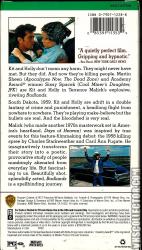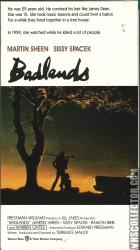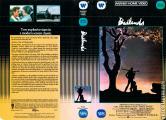Badlands
Catalog Number
11135
-
Primary Distributor (If not listed, select "OTHER")
Catalog Number
11135
Primary Distributor (If not listed, select "OTHER")
Release Year
Country
N/A (NTSC)
N/A | N/A | N/A
N/A | N/A
Badlands (1973)
Additional Information
Additional Information
He was 25 years old. He combed his hair like James Dean. She was 15. She took music lessons and could twirl a baton. For a while they lived together in a tree house. In 1959, she watched while he killed a lot of people.
In 1959 a lot of people were killing time. Kit and Holly were killing people.
"He wanted to die with me and I dreamed of being lost forever in his arms." A young couple goes on a Midwest crime spree in Terrence Malick's hypnotically assured debut feature, based on the 1950s Starkweather-Fugate murders. Fancying himself a rebel like James Dean, twentysomething Kit (Martin Sheen) takes off with teen baton-twirler Holly (Sissy Spacek) after shooting her father (Warren Oates) when he tries to split the pair up. Once bounty hunters discover their riverside hiding place, Kit and Holly head toward Saskatchewan, leaving dead bodies in their wake. As the law closes in, however, Holly gives herself up -- but Kit doesn't hold it against her, as he basks in his new status as a momentary folk hero. Inaugurating the use of voice-over narration that he would continue in Days of Heaven (1978) and The Thin Red Line (1998), Malick juxtaposes Holly's flat readings of her flowery romance-novel diary prose with the banal and surreal details of their journey. Singularly inarticulate with each other, Kit and Holly are more intrigued by mythic celebrity gestures, as Holly peruses her fan magazines and Kit commemorates key moments before orchestrating a properly dramatic capture for himself (complete with the right hat). The sublime visuals lend a dreamlike beauty to the couple's trip even as their actions are treated casually; Malick neither glamorizes Kit and Holly nor consigns them to the bloody end of their fame-fixated predecessors in Bonnie and Clyde (1967). With the couple's opaque dialogue and Holly's fanzine dream narration, Malick further denies an easy explanation for their crimes. Made for under 500,000 dollars, Badlands debuted at the 1973 New York Film Festival, along with Martin Scorsese's Mean Streets, and was released within months of two other outlaw-couple road movies, Steven Spielberg's The Sugarland Express and Robert Altman's Thieves Like Us. Although Badlands did not make an impression at the box office, its pictorial splendor and cool yet disquieting narrative established Malick as one of the most compelling artists to come out of early-'70s Hollywood.
Badlands is a 1973 American crime film written and directed by Terrence Malick, starring Martin Sheen and Sissy Spacek.[1] Warren Oates and Ramon Bieri are also featured. Malick has a small speaking part, although he does not receive an acting credit. The story, though fictional, is loosely based on the real-life murder spree of Charles Starkweather and his girlfriend, Caril Ann Fugate, in 1958,[2] though such a basis was not acknowledged when the film was released.[3]
In 1993, five years after the United States National Film Registry was established, Badlands was selected for preservation by the Library of Congress as being "culturally, historically, or aesthetically significant".
Badlands was the closing feature film at the 1973 New York Film Festival,[2] reportedly "overshadowing even Martin Scorsese's Mean Streets."[8] Vincent Canby, who saw the film at its Festival debut, called it a "cool, sometimes brilliant, always ferociously American film"; according to Canby, "Sheen and Miss Spacek are splendid as the self-absorbed, cruel, possibly psychotic children of our time, as are the members of the supporting cast, including Warren Oates as Holly's father. One may legitimately debate the validity of Malick's vision, but not, I think, his immense talent. Badlands is a most important and exciting film."[2] In April 1974, Jay Cocks wrote the film "might better be regarded less as a companion piece to Bonnie and Clyde than as an elaboration and reply. It is not loose and high-spirited. All its comedy has a frosty irony, and its violence, instead of being brutally balletic, is executed with a dry, remorseless drive."[3]
Writing years later for The Chicago Reader, Dave Kehr wrote "Malick's 1973 first feature is a film so rich in ideas it hardly knows where to turn. Transcendent themes of love and death are fused with a pop-culture sensibility and played out against a midwestern background, which is breathtaking both in its sweep and in its banality."[9] Spacek later said that Badlands changed the whole way she thought about filmmaking. "After working with Terry Malick, I was like, 'The artist rules. Nothing else matters.' My career would have been very different if I hadn't had that experience".[10] In 2003, Bill Paxton said:[11]
"It had a lyricism that films have only once in a while, moments of a transcendental nature.... You've seen these kinds of moments in other films – they're really hard to pull off, and usually they come off as a pretension. [Malick] knew how to set his characters against the landscape. There's this wonderful sequence where the couple have been cut adrift from civilisation. They know the noose is tightening and they've gone off the road, across the Badlands. You hear Sissy narrating various stories, and she's talking about visiting faraway places. There's this strange piece of classical music [an ethereal orchestration of Erik Satie's Trois Morceaux en forme de Poire], and a very long-lens shot. You see something in the distance – I think it's a train moving – and it looks like a shot of an Arabian caravan moving across the desert. These are moments that have nothing to do with the story, and yet everything to do with it. They're not plot-orientated, but they have to do with the longing or the dreams of these characters. And they're the kind of moments you never forget, a certain kind of lyricism that just strikes some deep part of you and that you hold on to."
The film has a 'Fresh' 98% rating on Rotten Tomatoes, and an average score of 8.9/10 based on the reviews of 47 critics.
Release Date: October 15, 1973
Distrib: Warner Brothers
In 1959 a lot of people were killing time. Kit and Holly were killing people.
"He wanted to die with me and I dreamed of being lost forever in his arms." A young couple goes on a Midwest crime spree in Terrence Malick's hypnotically assured debut feature, based on the 1950s Starkweather-Fugate murders. Fancying himself a rebel like James Dean, twentysomething Kit (Martin Sheen) takes off with teen baton-twirler Holly (Sissy Spacek) after shooting her father (Warren Oates) when he tries to split the pair up. Once bounty hunters discover their riverside hiding place, Kit and Holly head toward Saskatchewan, leaving dead bodies in their wake. As the law closes in, however, Holly gives herself up -- but Kit doesn't hold it against her, as he basks in his new status as a momentary folk hero. Inaugurating the use of voice-over narration that he would continue in Days of Heaven (1978) and The Thin Red Line (1998), Malick juxtaposes Holly's flat readings of her flowery romance-novel diary prose with the banal and surreal details of their journey. Singularly inarticulate with each other, Kit and Holly are more intrigued by mythic celebrity gestures, as Holly peruses her fan magazines and Kit commemorates key moments before orchestrating a properly dramatic capture for himself (complete with the right hat). The sublime visuals lend a dreamlike beauty to the couple's trip even as their actions are treated casually; Malick neither glamorizes Kit and Holly nor consigns them to the bloody end of their fame-fixated predecessors in Bonnie and Clyde (1967). With the couple's opaque dialogue and Holly's fanzine dream narration, Malick further denies an easy explanation for their crimes. Made for under 500,000 dollars, Badlands debuted at the 1973 New York Film Festival, along with Martin Scorsese's Mean Streets, and was released within months of two other outlaw-couple road movies, Steven Spielberg's The Sugarland Express and Robert Altman's Thieves Like Us. Although Badlands did not make an impression at the box office, its pictorial splendor and cool yet disquieting narrative established Malick as one of the most compelling artists to come out of early-'70s Hollywood.
Badlands is a 1973 American crime film written and directed by Terrence Malick, starring Martin Sheen and Sissy Spacek.[1] Warren Oates and Ramon Bieri are also featured. Malick has a small speaking part, although he does not receive an acting credit. The story, though fictional, is loosely based on the real-life murder spree of Charles Starkweather and his girlfriend, Caril Ann Fugate, in 1958,[2] though such a basis was not acknowledged when the film was released.[3]
In 1993, five years after the United States National Film Registry was established, Badlands was selected for preservation by the Library of Congress as being "culturally, historically, or aesthetically significant".
Badlands was the closing feature film at the 1973 New York Film Festival,[2] reportedly "overshadowing even Martin Scorsese's Mean Streets."[8] Vincent Canby, who saw the film at its Festival debut, called it a "cool, sometimes brilliant, always ferociously American film"; according to Canby, "Sheen and Miss Spacek are splendid as the self-absorbed, cruel, possibly psychotic children of our time, as are the members of the supporting cast, including Warren Oates as Holly's father. One may legitimately debate the validity of Malick's vision, but not, I think, his immense talent. Badlands is a most important and exciting film."[2] In April 1974, Jay Cocks wrote the film "might better be regarded less as a companion piece to Bonnie and Clyde than as an elaboration and reply. It is not loose and high-spirited. All its comedy has a frosty irony, and its violence, instead of being brutally balletic, is executed with a dry, remorseless drive."[3]
Writing years later for The Chicago Reader, Dave Kehr wrote "Malick's 1973 first feature is a film so rich in ideas it hardly knows where to turn. Transcendent themes of love and death are fused with a pop-culture sensibility and played out against a midwestern background, which is breathtaking both in its sweep and in its banality."[9] Spacek later said that Badlands changed the whole way she thought about filmmaking. "After working with Terry Malick, I was like, 'The artist rules. Nothing else matters.' My career would have been very different if I hadn't had that experience".[10] In 2003, Bill Paxton said:[11]
"It had a lyricism that films have only once in a while, moments of a transcendental nature.... You've seen these kinds of moments in other films – they're really hard to pull off, and usually they come off as a pretension. [Malick] knew how to set his characters against the landscape. There's this wonderful sequence where the couple have been cut adrift from civilisation. They know the noose is tightening and they've gone off the road, across the Badlands. You hear Sissy narrating various stories, and she's talking about visiting faraway places. There's this strange piece of classical music [an ethereal orchestration of Erik Satie's Trois Morceaux en forme de Poire], and a very long-lens shot. You see something in the distance – I think it's a train moving – and it looks like a shot of an Arabian caravan moving across the desert. These are moments that have nothing to do with the story, and yet everything to do with it. They're not plot-orientated, but they have to do with the longing or the dreams of these characters. And they're the kind of moments you never forget, a certain kind of lyricism that just strikes some deep part of you and that you hold on to."
The film has a 'Fresh' 98% rating on Rotten Tomatoes, and an average score of 8.9/10 based on the reviews of 47 critics.
Release Date: October 15, 1973
Distrib: Warner Brothers
Related Releases1
Catalog Number
11135
Primary Distributor (If not listed, select "OTHER")
Badlands (1973)
Release Year
Catalog Number
11135
Primary Distributor (If not listed, select "OTHER")
Catalog Number
11135









Comments0
Login / Register to post comments